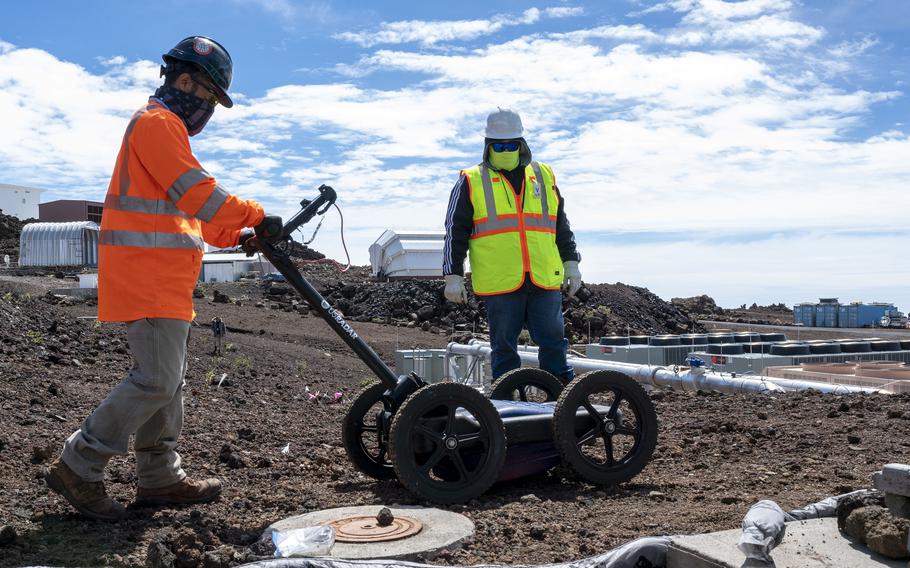
Contractors use a ground-penetrating radar to identify and map utility pipes and wires at the Maui Space Surveillance Complex in Hawaii, Feb. 21, 2023. (Jimmie Pike/U.S. Air Force)
FORT SHAFTER, Hawaii — The Department of the Air Force wants to cleanse fuel-soaked ground on Maui’s tallest peak, considered sacred in Native Hawaiian culture, by venting soil still in place and airing out contaminated soil previously excavated.
About 700 gallons of diesel fuel spilled in late January 2023 at the Maui Space Surveillance Complex atop the 10,000-foot summit of Haleakala, a dormant volcano.
The Maui-based 15th Space Surveillance Squadron, which is part of Space Delta 2, operates the complex. The Air and Space Force already face resistance to a plan to expand the facility by building new telescopes to track objects in space.
The complex is primarily used “to perform 24/7 deep space surveillance and satellite tracking while also supporting research and development projects and collaborating with outside organizations for space-monitoring efforts,” the Air Force said in a draft response action memorandum in July outlining its preferred method to clean up the site.
The 15th Space Surveillance Squadron is hosting an evening open house Aug. 15 at King Kekaulike High School, 121 Kula Highway, Makawao, to provide information about the proposed soil remediation.
The spill occurred when a lightning strike caused a malfunction in the fuel tank used for a generator on the site. The fuel spread into an area of about 750 square feet.
In March 2023, workers excavated soil 2 to 5 feet deep from the site. They were unable to dig deeper because of underground utilities, according to the Air Force memo.
About 30 cubic yards of soil was loaded into 41 “supersacks” that are stored at the site for eventual cleansing.
The excavated area was covered with heavy polymer sheeting, which was then covered with uncontaminated soil.
The process of cleaning the soil is complicated by the fact that Hawaiians regard Haleakala’s summit as sacred, and so no soil or stones should be removed from the site.
Ancient Native Hawaiians regarded the peak to be the navel, or center, of Maui, with cultural resources in the area dating back more than 1,000 years.
“There are numerous gods and goddesses said to reside on the summit, in the crater, and all around the mountain,” the memorandum states.
Air and Space Force officials faced public backlash against the military’s substantial presence in the state after a jet fuel spill from a Navy underground fuel storage facility in late 2021 contaminated groundwater used by thousands near Joint Base Pearl Harbor-Hickam.
In May, the Maui County Council unanimously approved a resolution opposing a plan by the Air Force and Space Force to build new telescopes on the mountain. The resolution cited the fuel spill on Haleakala and that the services have yet to clean it up, The Associated Press reported on June 6.
The Maui cleanup plan involves using bioventing and aeration to remove or reduce toxicity in the soil.
“Active bioventing involves using an electric blower that mechanically extracts air from venting wells resulting in increasing air circulation to subsurface soils,” the memorandum states.
“This will increase microbial metabolic rates due to the additional oxygen being circulated through the soil.”
Ten bioventing wells would be placed at depths up to 50 feet.
The extracted air would be treated to remove fuel vapors before being released into the atmosphere.
During the aeration process, the saturated soil in the supersacks would be placed above ground on polymer sheeting and surrounded by a berm “for treatment to decrease the remaining petroleum and constituent concentrations,” the memorandum states.
Questions and comments can be submitted until Sept. 15 to Jennifer Wehrmann, Remedial Project Manager, AFCEC/CZOP, 10471 20th Street, Suite 343, JBER, AK 99506-2201 or via email to pacaf.czop.remotesites@us.af.mil.